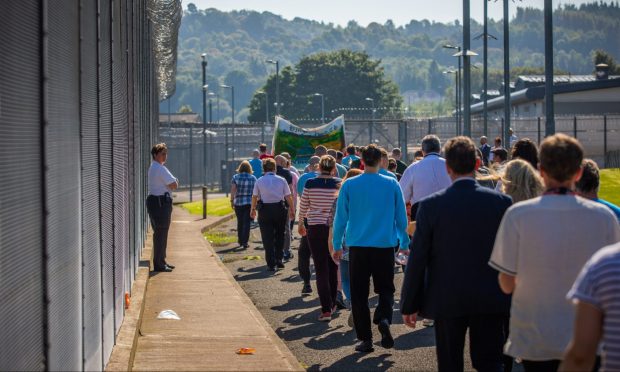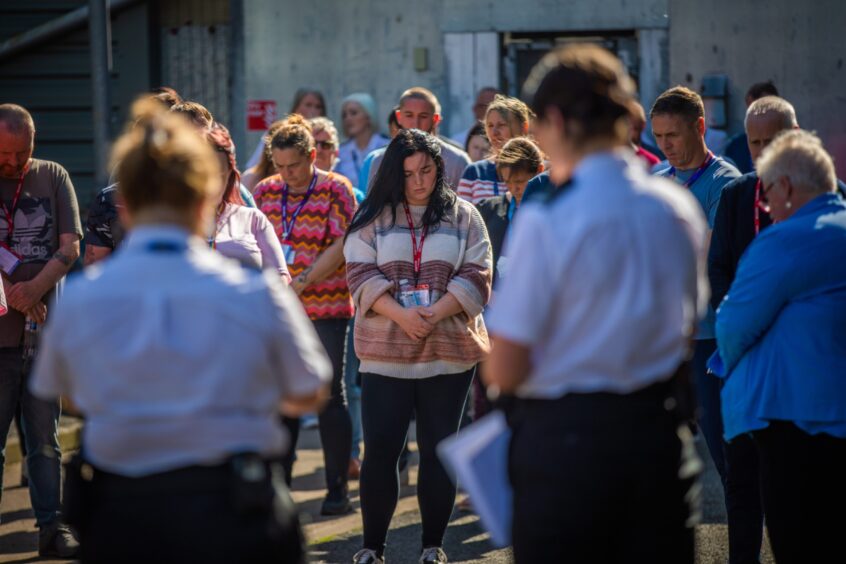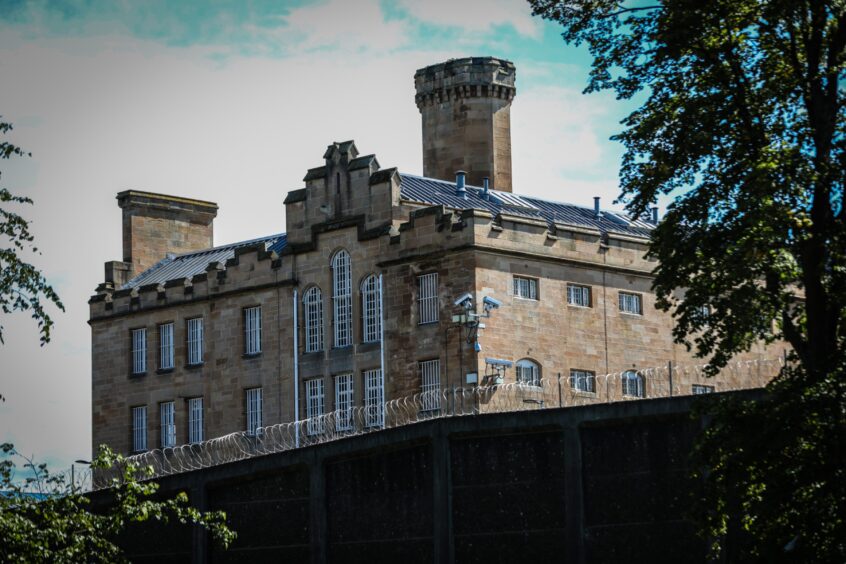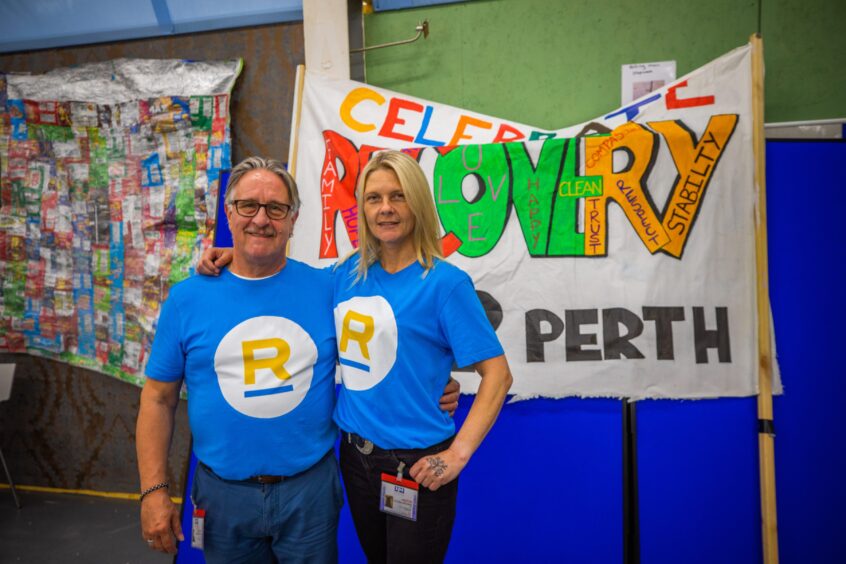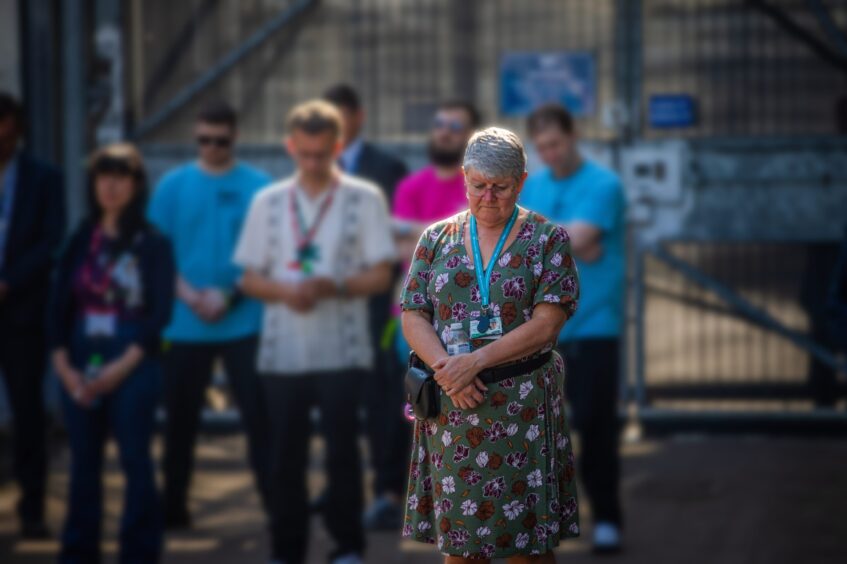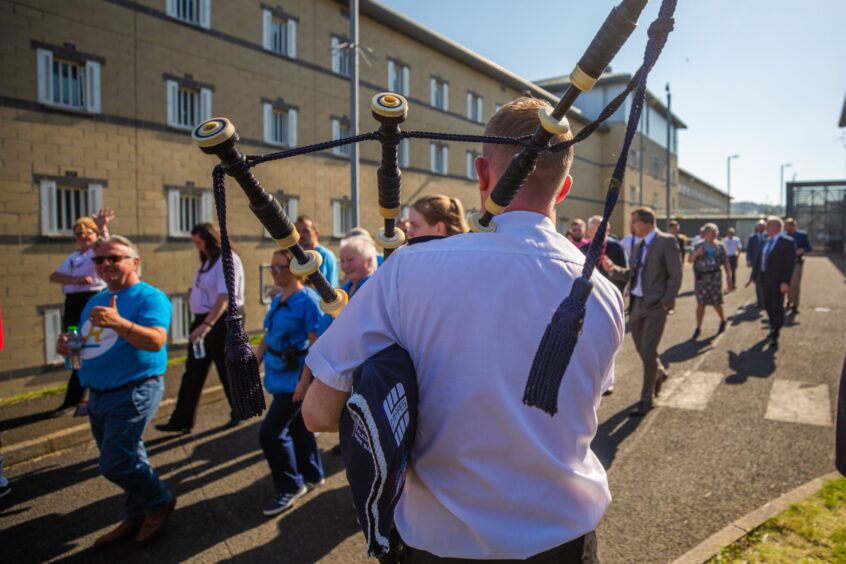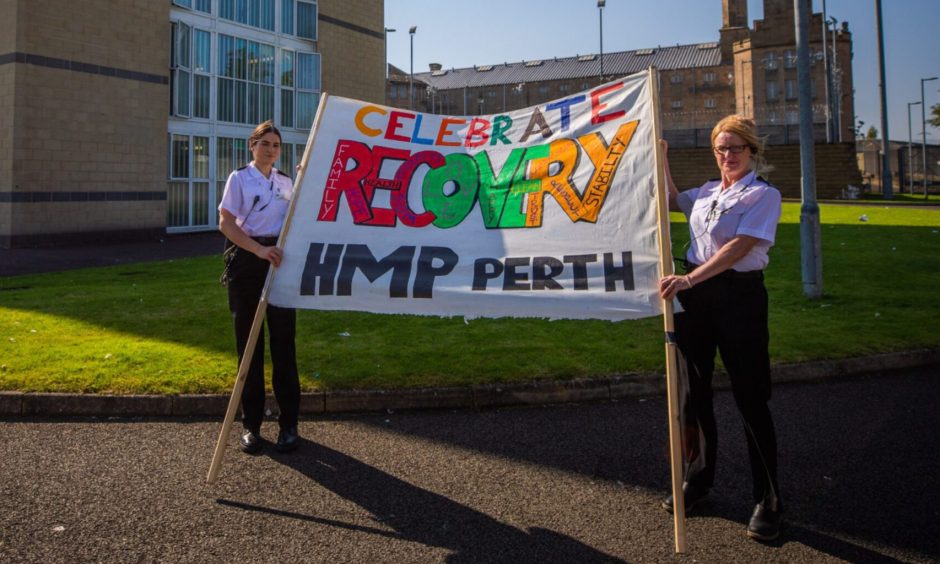Under the cloudless sky of a September afternoon, a procession of men emerges from within the maze of high walls, barbed wire, and security fences at HMP Perth.
These aren’t ordinary inmates. These are men who have chosen a different path, embarking on a journey of recovery from addiction.
They are taking part in HMP Perth’s Recovery Walk.
The walk – held during Scotland’s annual Recovery Week – is a solemn yet uplifting event designed to both honour those who have lost their lives to addiction and celebrate those who have made strides in overcoming their struggles.
For the men inside HMP Perth, it takes immense courage to join such a public display of hope and change.
“We’re focusing on the positive stuff,” says one of the prison officers.
“There’s a lot of good work happening, and we’re seeing men change their lives around.
“That’s what we want for every prisoner.”
What is HMP Perth Recovery Walk?
HMP Perth staff invited The Courier to join the walk, speak with frontline prison officers and to gain the perspective of former addicts who want to turn their lives around.
After being taken through security, photographer Steve MacDougall and I arrive inside one of the prison’s halls where participants – including support workers – are gathering.
Here, Oasis tunes are playing in the background, and colourful artwork created by prisoners adorns the walls.
After the prisoners escorted from their cells enter, and warm greetings take place, there’s a briefing.
But beyond these logistics, the message shared is deeply emotional—a message of hope, remembrance, and celebration.
There’s a round of applause for the individuals working tirelessly behind the scenes to make recovery possible.
A serenity prayer is read and a brief silence follows, honouring those who have lost their lives to addiction.
It’s a reminder that, behind the grim annual drugs death statistics that make the headlines, there are real people.
Taking part in the walk is not easy for prisoners
Accompanied by officers, the group is led through the labyrinth of prison corridors before stepping out into the bright warm sunshine.
Not everyone watching from behind barred windows necessarily understands or supports the cause.
Heckles from some inmates echo from above. They are a reminder of the entrenched stigma that still clings to addiction.
At the front of the procession, two recovering addicts unfurl a colourful banner emblazoned with the words “Celebrating Recovery HMP Perth.”
Within its letters are written powerful messages: family, hope, love, happiness, compassion.
As the bagpipes fire up, the atmosphere is upbeat and relaxed as the procession sets off.
The march reminds prisoners the road to recovery, though difficult, is achievable.
As the walk ends, and the heckling from unseen inmates subsides, there’s hope that others will be inspired to turn their lives around.
Murderer tells of ‘chaotic’ childhood and desire to turn life around
After the walk. The Courier is given the opportunity to sit down with one of the participants – a former addict in his 30s serving life at HMP Perth for murder.
Speaking on condition of anonymity, he explains that he killed a relative and was ordered to serve more than 14 years before being eligible for parole.
With around two years left of his sentence, he is determined to turn his life around and to help other prisoners by telling them his story.
But he also believes there needs to be more societal understanding about how poverty and addiction – while not an excuse – can lead to a trans-generational spiral.
“I always tell people that 99% of the reasons why people end up on drugs or in prison are to do with the system which I can’t change.
“The remaining 1% I can do something about and make a positive difference.
“But it’s just bad that I had to take someone’s life to see this.”
‘Stress and anxiety’ of upbringing
Addicted to drink and drugs before he committed murder, he paints a picture of the “chaotic” upbringing that blighted his early years.
Explaining how he was first taken into care aged five after being picked up on the streets while searching for his alcoholic mother, he speaks of the “stress and anxiety” he experienced in foster homes.
While he was allowed back with his mum aged seven, she was still an alcoholic. He describes a chaotic time thereafter of “abuse, abandonment and alcohol”.
His memories of that time include “sexual abuse”, an older sister being sentenced and his mum almost setting the house on fire.
Only now does he understand the impact.
“I was always fighting at school.” He says he came close to killing a cousin at primary. “I used to love fighting with people and seeing blood.”
Only when he was eight and his wee sister was born, did he become “anti-violence”.
When he was 12, his residential school discovered he was his baby sister’s full time carer. His sister was taken into care.
Knowing that his sister was “safe”, it was a chance for him to concentrate on himself.
But despite his efforts, he fell into a spiral of drink and drugs to “fit in with other boys”.
Spiral of drug abuse deepened
He says he tried to join the army at 16, but an issue with paperwork left him back living with his mum.
What followed was various run-ins with the police, time in and out of hostels and six months sleeping on the streets, where he felt “safer”.
He started taking more drugs. Speed, then coke. He’d drink alcohol by day and valium at night.
He graduated from crack to heroin. He sniffed it at first, then he began injecting.
More chaos followed until things reached a head in 2012 when he killed his relative during a row, and he was jailed for life.
Thanks to the support he’s receiving in prison, he’s determined to stay out of jail when released.
And if any other positives should come from where he is today, it’s his determination to help others have a brighter future.
The importance of recovery
He is only one of the prisoners to benefit from the walk
I speak to two HMP Perth recovery development officers, again on condition of anonymity.
They tell me the walk is a local contribution to the long-standing national Scottish Recovery Consortium (SRC) Recovery Walk.
HMP Perth’s Recovery Walk takes place annually with other initiatives, marking the prison as a leader in this movement.
It’s a call to challenge the stigma of addiction, to stop associating drug deaths with images of needles, and to focus on stories of survival and success.
The officers emphasise the importance of celebrating recovery, particularly in a prison environment where negativity often overshadows progress.
Peer support, lived experience, and strong links to care services play crucial roles in this process.
The prisoners who walk are living proof that recovery is not only possible but worth celebrating.
